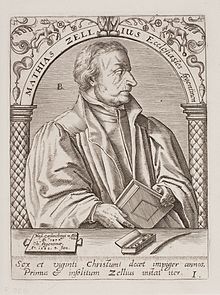Matthäus Zell
Matthäus Zell (also: Mathias Zell ; born September 21, 1477 in Kaysersberg ; † January 9, 1548 in Strasbourg ) was an Alsatian Lutheran theologian and reformer.
Life
Matthäus Zell was the son of a wine grower in Kaysersberg. He studied at the universities of Mainz , Erfurt and Freiburg im Breisgau . His compatriot Johann Geiler von Kaysersberg exerted a strong influence on him. He read in Freiburg in the artistic and later in the theological faculty. Here was Urbanus Rhegius his student. In 1518 he became a preacher at Strasbourg Cathedral , where he began to preach in the Lutheran sense in 1521. Since the doctor's pulpit in the cathedral remained closed to him, the congregation set up a special sermon chair for him. In his sermon he was not dependent on Martin Luther , but he read Luther's writings eagerly and let him introduce him to the understanding of the scriptures. Involved in heavy struggles because of his "Heretical Opinion", he wrote the text "Christian Responsibility" as a justification for his view, the first Reformation phenomenon of his own on Alsatian soil.
This demeanor did not fail to influence the council, which decided that in future “only the Holy Gospel and the teaching of God” should be proclaimed publicly in Strasbourg. When Zell entered into marriage with Katharina Schütz on December 3, 1523 and was married by Martin Bucer , his own confession was made. Even if Bucer, Wolfgang Capito and Kaspar Hedio soon became more prominent, he remained the popular and popular preacher. Church politics did not suit him, and he did not get involved in theological doctrinal differences either.
His colleagues did not always understand his attitude, which was simple and directed towards practical life. His main interest was the work in his community, pastoral care. His generosity was so great that he accepted Kaspar Schwenckfeld and other outsiders into his home. He was in fraternal relations with the Swiss, however much he admired Luther. Without having taken part directly in the Wittenberg Agreement , he traveled to Luther in 1538. In addition, he directed his care to the Upper German communities.
He showed a keen interest in Christian teaching. His catechism works appeared in 1534/36; Particularly noteworthy was his "Kurtze written declaration for the children and the beginning". Like his wife Katharina Zell , he loved young people and gave them plenty of support. When he died, the whole city of Strasbourg mourned him. He was a man of lively faith and active love who was very important to Strasbourg.
His nephew Heinrich Zell , a cartographer in Prussia , inherited the couple's wedding rings.
literature
- Real Encyclopedia for Protestant Theology and Church , Volume 21, p. 650
- TW Röhricht: Matthäus Zell . In: Communications from the history of the Evangelical Church of Alsace 3, 1855, pp. 84–154.
- Johann Wilhelm Baum : Capito and Butzer. Strasbourg reformers. Represented from her handwritten letters, her printed writings and other contemporaneous sources . Friderichs, Ebernfeld 1860, pp. 195ff.
- A. Erichson: Zell, Matthäus . In: Allgemeine Deutsche Biographie (ADB). Volume 45, Duncker & Humblot, Leipzig 1900, p. 17 f.
- Michel Weyer: L'Apologie chrétienne du réformateur strasbourgeois Matthieu Zell (Christian responsibility, 1523) . 3 volumes, dissertation Université de Strasbourg 1981 (unprinted).
- Michel Weyer: Martin Bucer et les Zell: Une solidarité critique . In: Christian Krieger, Marc Lienhard (Ed.): Martin Bucer and Sixteenth Century Europe. Actes du colloque de Strasbourg (28-31 aout 1991) . Leiden-New York-Cologne 1993, pp. 275-295.
- Konrad Fuchs: Zell, Matthäus. In: Biographisch-Bibliographisches Kirchenlexikon (BBKL). Volume 14, Bautz, Herzberg 1998, ISBN 3-88309-073-5 , Sp. 383-385.
- Michel Weyer: Zell, Matthieu . In: Nouveau dictionnaire de biographie alsacienne . Faszikel 41, 2003, pp. 4352ff.
Individual evidence
- ^ Elsie Anne McKee: Katharina Schütz Zell. Vol. 1: The life and thought of a sixteenth-century reformer. Brill, Leiden 1999, p. 224 ( limited preview in the Google book search).
| personal data | |
|---|---|
| SURNAME | Zell, Matthew |
| ALTERNATIVE NAMES | Zell, Mathias |
| BRIEF DESCRIPTION | Alsatian theologian and reformer |
| DATE OF BIRTH | September 21, 1477 |
| PLACE OF BIRTH | Kaysersberg |
| DATE OF DEATH | January 9, 1548 |
| Place of death | Strasbourg |
